Despre Psalmul 2 se mai pot spune atât de multe lucruri. Tocmai de aceea am cules o mulțime de resurse pe marginea acestui Psalm care sper să vă ajute să-i aprofundați mesajul.
Vizionează VLOG-ul pe YouTube
PARTITURI
INTERPRETĂRI MUZICALE ALE PSALMULUI 2
ISUS ÎN PSALMUL 2
COMENTARIUL LUI SPURGEON ÎN ROMÂNĂ
PREDICI
ECOURI ALE PSALMULUI 2 ÎN NOUL TESTAMENT
Tabel preluat din Novum Testametum Gracece - Nestle-Aland, NA28 (cu permisiune)
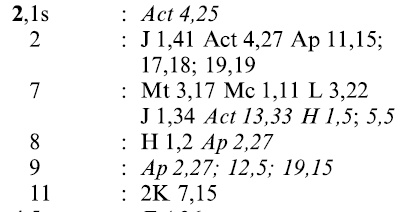
Mi-a plăcut mult observația pe care mi-a făcut-o prietenul meu Alex Macarie legat de primii doi Psalmi. Iată ce zicea el:
Psalmul 1 îl prezintă pe Isus ca Om, iar Psalmul 2 îl prezintă ca fiind Dumnezeu întrupat, așa cum argumentează Evrei 1. Acest punct extrem de important astăzi, atât pentru evreii care neagă divinitatea lui Mesia, cât și pentru cei care poartă numele de creștin și totuși neagă egalitatea divină a Fiului cu Tatăl (unitarineii și iehoviștii). Dacă nu ne închinăm unui Mântuitor complet divin, ne închinăm unui idol, iar un idol nu poate să mântuie, și idolatrii prin urmare nu se vor găsi în cer dacă mor fără pocăință și credință în Mijlocitorul care este și Om și Dumnezeu, în două naturi distincte, iar o singură Persoană pentru totdeauna. Precum primi 2 Psalmi setează tonul pentru restul Psaltirii, adevărul absolut esențial despre umanitatea și divinitatea lui Hristos pornesc de aici și sunt țesute prin întreg restul Psaltirii. Hristos este egal cu Tatăl, fiind părtaș al aceleiași naturi infinite, veșnice și neschimbătoare în a Sa Ființă, înțelepciune, putere, sfințenie, dreptate, bunătate și în al Său adevăr.
Apoi mi-a spus că a tradus un material în care se argumentează pentru divinitatea Domnului Isus din Biblie. Îl împărtășesc cu drag cu voi.
COMENTARIU DIN CARTEA: CHRIST AND HIS CHURCH IN THE BOOK OF PSALMS de Andrew Bonar

O puteti citi gratuit aici: https://www.monergism.com/thethreshold/sdg/bonar/Christ%20and%20His%20Church%20in%20the%20Bo%20-%20Andrew%20Bonar.pdf

COMENTARIUL INTEGRAL
PSALM 2 1–12
WE have a quotation from this Psalm in Acts 13:33, where recent criticism reads, "As it is written in the first Psalm." It is not unlikely that it had at one time been considered as a second part of Psalm 1, instead of standing as a separate hymn of praise. But, at all events, it is appropriate advance upon the preceding, inasmuch as it places before us the Righteous One in a new position.
The view taken of Messiah by the world and by Jehovah is the theme; our eye is fixed on the purpose of Jehovah, triumphantly accomplished in Messiah's glory, in spite of all opposition. Nor let us forget the quotation of ver. 1, 2, in Acts 4:23, which countenances us in asserting that it speaks of the fierce enmity of the world to the Righteous One from the period of his First coming onward to his Second appearing. The nations, or Gentiles (ּיםִגוֹ ,(have raged, and the tribes of Israel (יםֹאמּ ֻל (ְhave agreed in hostility to the Lord's Messiah, ever since the day when Jew and Gentile met at Calvary to kill the Prince of life; and their rage is not evaporated, but shall be manifested more fiercely still when the beast and the false prophet lead on their hosts to Armageddon. It is quoted with reference to that day in Rev. 2:27, 11:18; and 19:15, quotes "the rod of iron," from ver. 9. Perhaps the expression used so frequently in the epistles, "fear and trembling," is taken from ver. 11. It is used in exhortations to servants (Ephes. 6:5) regarding duty; in Philip. 2:13, to all believers engaged in striving for holiness; while in 1 Corinth. 2:3, Paul describes his state of mind in his ministry at Corinth by these terms. May there not be a reference in all these, and similar passages, to our Psalm? It is as if it had been said, Remember our instructions for serving our King Messiah, in prospect of his glorious coming and kingdom—"Serve the Lord with fear, and rejoice with trembling." Even the Jews are pretty nearly agreed that no other than Messiah is the theme of the sweet singer of Israel here. "Anointed" is considered as decisive—it is Messiah, Christ.
By some readers, however, the introduction of Christ by the name of "Son," in ver. 7, and then in ver. 12, (where the rarer term בר ַoccurs, probably because poetical and lofty, as in Prov. 31:2,) has been thought abrupt. But, abrupt as it may seem, there is no doubt hanging over the application. Messiah is "my Son," and so exclusively pre-eminent in this, that Jehovah, pointing to him, calls on all men to honour the Son even as they honour the Father—"Kiss the Son." Had not our Lord this very passage in his eye when he spoke these words (John 5:23): "The Father hath committed all judgment to the Son, that all men should honour the Son even as they honour the Father?" And it is thus we can understand how the term "Father," as applied to Godhead, broke upon the ear of Israel without exciting surprise, when John the Baptist (John 1:18), spoke of the "only begotten Son who is in the bosom of the Father." Son and Father are co-relative terms, and would be so understood by John. Whether, with Hengstenberg and most other interpreters, we render ver. 12, "A little while and his wrath shall be kindled," or retain the common version, there is, no doubt, a reference to this verse in Rev. 6:16, 17: "The wrath of the Lamb, … and who shall be able to stand?"
And if the former rendering be adopted, as we believe it ought, then there is a tacit reference to this passage in the New Testament expression, Rev. 22:7, "I come quickly." It is as if he said, Come quickly to that Saviour for eternal life; for lo! he Cometh quickly to deal with all who obey not the Gospel. Opposition ends in ruin submission brings a blessedness, the fulness of which shall be known only on the day of wrath. But let us examine the contents of this rich and lofty Psalm. The plan of it is simple, but very grand. Messiah, on the morning when he broke the bands of death, is contemplating our world lying in wickedness. He beholds a sea of raging hatred and hostility clashing its angry waves on the throne of God and his anointed One.* He hears their scornful words, "Let us break their bands asunder," and marvels at their infatuation. For, lo! in the heavens above, Jehovah sits in long-suffering calmness, till their stubborn and long-lasting enmity compels him to arise against them. He "troubles them" (ver. 5) as he did the Egyptians at the Red Sea, and referring to their haughty words, declares (ver. 6) "They on their part so speak, and I (ניִא (ֲin spite of them, have set my king in Zion." They may try to make Rome, or any other city, their metropolis, and may set up a head to themselves, but Jehovah will set up his King, and make Zion —the platform of Jerusalem—his metropolis, as certainly as he set David on the throne and made Zion his capital.
From that city of the greater than David has gone and shall again go forth the law. Yes, says Messiah, I will proclaim Jehovah's resolution or decree; He has said to me, "Thou art my Son." At his resurrection (Rom. 1:3) he was saluted as "Son," because appearing then in his own proper array; no more hid in humiliation. He had been Son from eternity, but having dived under our ocean of sin and misery, his sonship seemed obscured till he emerged at his resurrection on the third day. (Acts 13:33) And even so again, when he appears in glory at his coming, investing his own with their resurrection-dress (their proper clothing as adopted sons), the long-unseen Son of God shall be saluted as "My Son" by the Father as he places him on his visible throne. At what time that manifestation shall occur depends on his own request (ver. 8)—a request which he shall prefer whenever his purposes are ripe— and then He arises to shake terribly the earth.
Does the reader not recognise in ver. 10, the voice of the tender, long-suffering, compassionate Saviour? It resembles his mode of expostulation in Proverbs 1:23, in prospect of that "laugh" which is the extreme opposite of pity, and which is referred to in Prov. 1:26, as used by himself against his unyielding foes, even as it is here by the Father. (Ver. 4) Come, then, great and small, fall upon his neck, and be reconciled now. Be well pleased with him with whom the Father is well pleased; "Kiss the Son,"—this is saving faith. For, "Yet a little while and his wrath shall be kindled." (Ver. 12) Behold, he comes quickly! Blessed are all they who put their trust in him. It is not, then, to be forgotten that the time when Messiah utters these strains is supposed to be the time of his resurrection. This seems to be declared to us in Acts 13:33. He had felt the united assault of earth and hell, but had proved all to be vain; for He that sat in heaven had gloriously raised him from the dead, and his enemies had sunk to the ground as dead men.
We might imagine this Psalm poured forth by him as he stood in Joseph's garden, beholding the empty sepulchre on the one hand, and the glory at the right hand of the Father on the other. It is thus we easily understand the words in ver. 7: "This day have I begotten thee;" the Father declaring him his "only begotten," by raising him from the dead, and doing this as a pledge of his farther exaltation,—placing him (ver. 8) in the position of Intercessor, ere he shall arise to return as acknowledged Conqueror and King. Glancing back now upon Psalm 1, in connection with this more lofty and triumphant song, we see how appropriately the book of Israel's sacred songs has begun. It has sketched to us the calm, holy path of the righteous, and then the final results in the day of victory, when the Anointed shall have put down all enemies, and the way of the ungodly shall have perished. We shall meet with these topics continually recurring in the course of the book; it was good, then, to present an epitome at the outset.
Glancing, also, at particular expressions in both psalms, we see, at the beginning and end, links of connection with the preceding, in such expressions as ver. 1, "meditating a vain thing," in contrast to the meditating on the law (Psa. 1:3), while "the way of the ungodly shall perish," in Psalm 1:6, is brought to mind when we read in ver. 12 of "their perishing from the way." It carries our thoughts to Joshua 23:16. as Psa. 1:3 did to Joshua 1:8. And does not the Baptist get his expression, "chaff he shall burn with unquenchable fire" (Matt. 3:12) by joining Psa. 1:4, and 2:12? Our Lord, when on earth, might read this Psalm as his history,—the Righteous One, who ever meditated on the law of the Lord, and kept aloof from the vain meditations of the heathen, opposed by men who could not submit to the restraints of holiness, but in spite of all, exalted at length to honour. For here we have Messiah, (the head of every one who seeks Jehovah's face), exhibited in his majesty, and in full prospect of final triumph. The subject of the whole may thus be said to be the assertion of "the righteous One's claims to the throne." Some one has proposed to entitle it rather, "The eternal decree," in reference to ver. 6, of which the Psalm might be spoken of as the development.
But inasmuch as the Eternal decree forms only one topic, while the burden is Messiah himself directly, it is undoubtedly more exact and descriptive to give as its title, The certainty of the Righteous One's exaltation to the throne.
Alte Conexiuni între Psalmul 2 și Noul Testament (din ESV Study Bible)
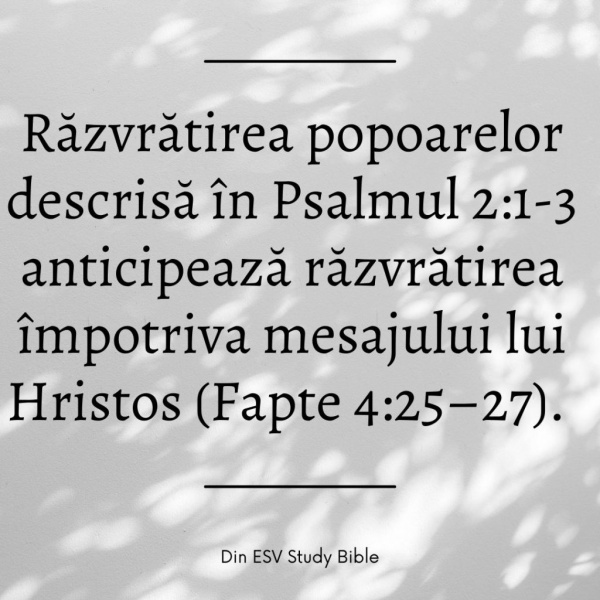
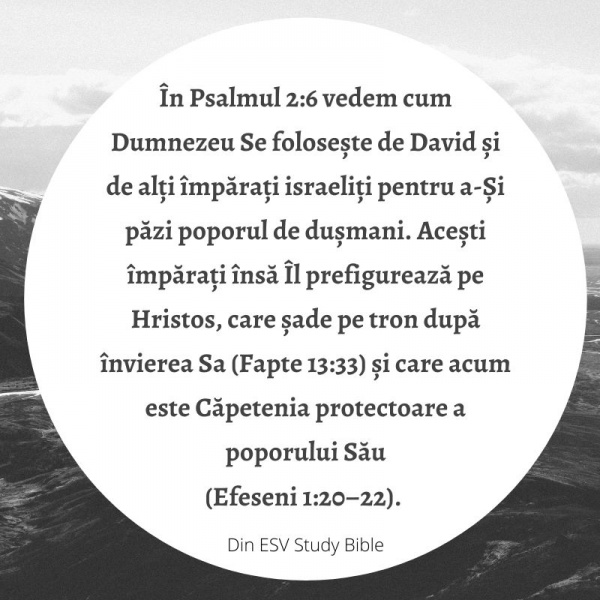



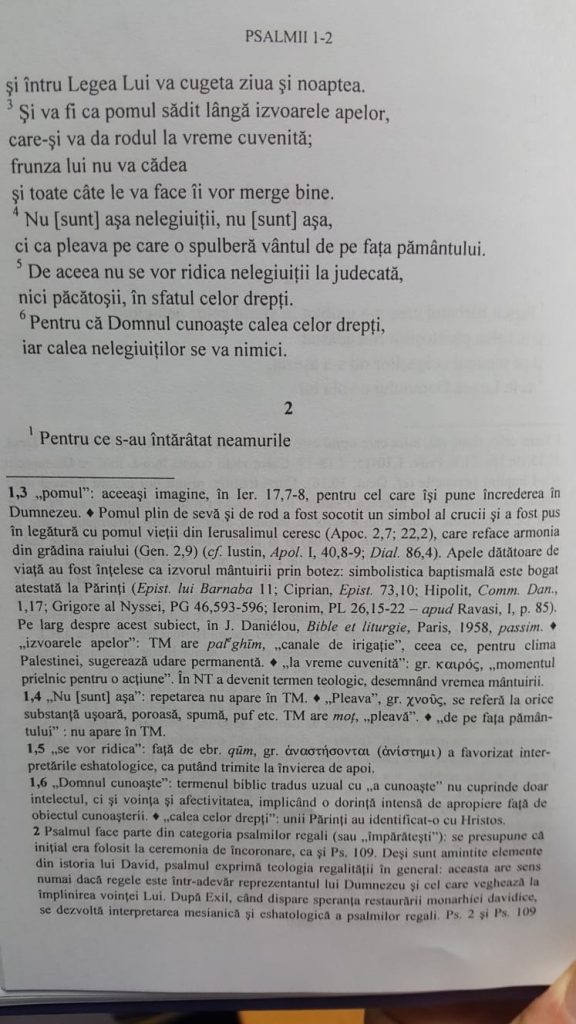


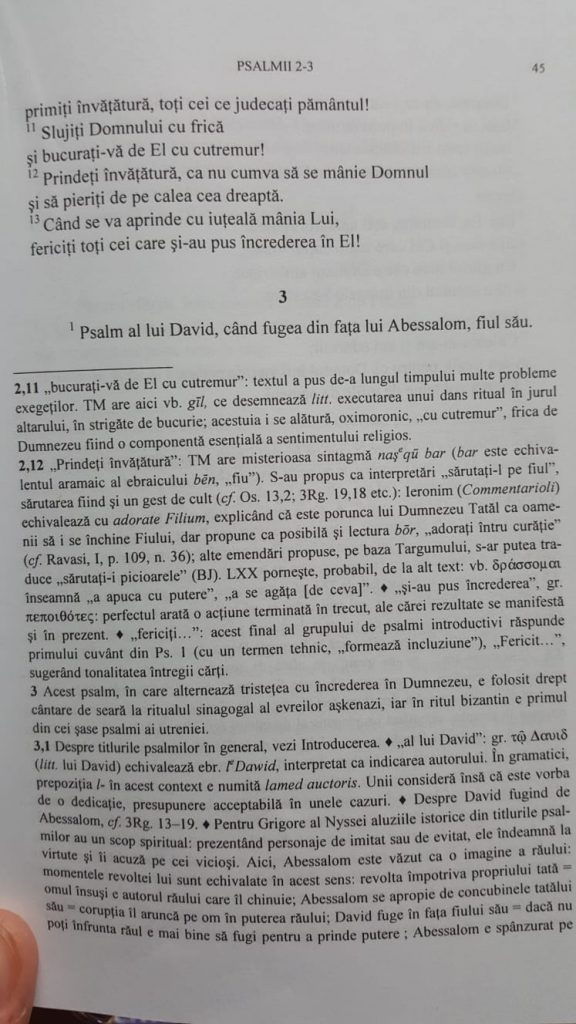
PSALMUL 2 VERSIFICAT DIN CEA MAI VECHE PSALTIRE VERSIFICATĂ INTEGRAL DIN ROMÂNIA: PSALTERIUM HUNGARICUM din 1660 realizată de Ștefan Fogaresi.
Versurile se cântau pe melodia din Psaltirea Franceză de la Geneva (vezi mai sus)

În curând vor apărea și alte resurse....
Vezi și:






